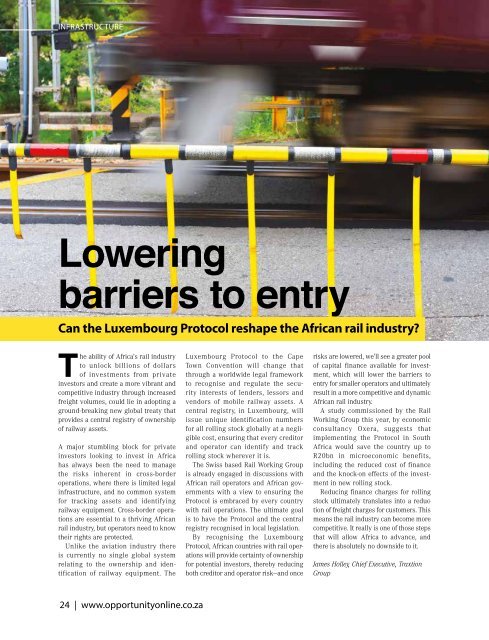Opportunity Issue 88 - Sept-Oct 2018
Create successful ePaper yourself
Turn your PDF publications into a flip-book with our unique Google optimized e-Paper software.
INFRASTRUCTURE<br />
Lowering<br />
barriers to entry<br />
Can the Luxembourg Protocol reshape the African rail industry?<br />
The ability of Africa’s rail industry<br />
to unlock billions of dollars<br />
of investments from private<br />
investors and create a more vibrant and<br />
competitive industry through increased<br />
freight volumes, could lie in adopting a<br />
ground-breaking new global treaty that<br />
provides a central registry of ownership<br />
of railway assets.<br />
A major stumbling block for private<br />
investors looking to invest in Africa<br />
has always been the need to manage<br />
the risks inherent in cross-border<br />
operations, where there is limited legal<br />
infrastructure, and no common system<br />
for tracking assets and identifying<br />
railway equipment. Cross-border operations<br />
are essential to a thriving African<br />
rail industry, but operators need to know<br />
their rights are protected.<br />
Unlike the aviation industry there<br />
is currently no single global system<br />
relating to the ownership and identification<br />
of railway equipment. The<br />
Luxembourg Protocol to the Cape<br />
Town Convention will change that<br />
through a worldwide legal framework<br />
to recognise and regulate the security<br />
interests of lenders, lessors and<br />
vendors of mobile railway assets. A<br />
central registry, in Luxembourg, will<br />
issue unique identification numbers<br />
for all rolling stock globally at a negligible<br />
cost, ensuring that every creditor<br />
and operator can identify and track<br />
rolling stock wherever it is.<br />
The Swiss based Rail Working Group<br />
is already engaged in discussions with<br />
African rail operators and African governments<br />
with a view to ensuring the<br />
Protocol is embraced by every country<br />
with rail operations. The ultimate goal<br />
is to have the Protocol and the central<br />
registry recognised in local legislation.<br />
By recognising the Luxembourg<br />
Protocol, African countries with rail operations<br />
will provide certainty of ownership<br />
for potential investors, thereby reducing<br />
both creditor and operator risk—and once<br />
risks are lowered, we’ll see a greater pool<br />
of capital finance available for investment,<br />
which will lower the barriers to<br />
entry for smaller operators and ultimately<br />
result in a more competitive and dynamic<br />
African rail industry.<br />
A study commissioned by the Rail<br />
Working Group this year, by economic<br />
consultancy Oxera, suggests that<br />
implementing the Protocol in South<br />
Africa would save the country up to<br />
R20bn in microeconomic benefits,<br />
including the reduced cost of finance<br />
and the knock-on effects of the investment<br />
in new rolling stock.<br />
Reducing finance charges for rolling<br />
stock ultimately translates into a reduction<br />
of freight charges for customers. This<br />
means the rail industry can become more<br />
competitive. It really is one of those steps<br />
that will allow Africa to advance, and<br />
there is absolutely no downside to it.<br />
James Holley, Chief Executive, Traxtion<br />
Group<br />
24 | www.opportunityonline.co.za


















